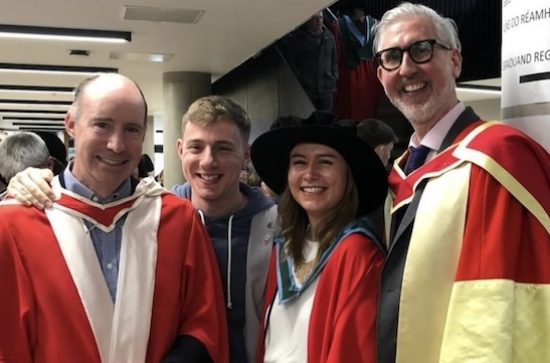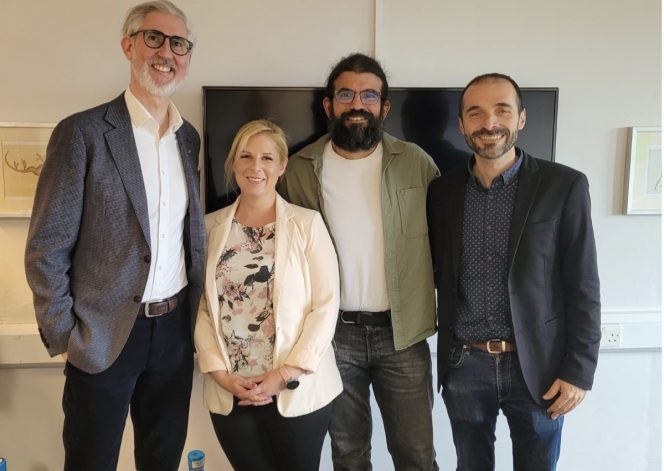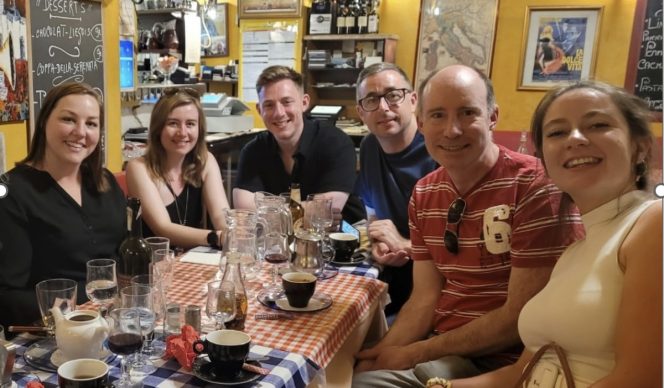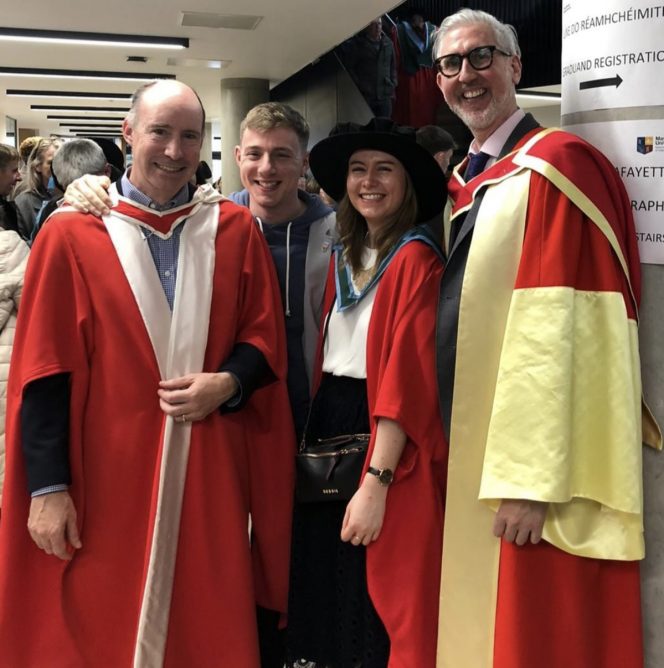
Our Postgraduate Research Spotlight Series aims to showcase the diverse range of cutting-edge research undertaken by postgraduate research students in our Department, and to highlight and celebrate their academic achievements as they stand on the cusp of PhD graduation. During the second quarter of 2024, four of our postgraduate students, Austin Fahy, Dawn Higgins, Brian Leavy, and Conor Thornberry successfully defended their research theses – we extend our warmest congratulations to Austin, Dawn, Brian and Conor, and to their supervisors and wider circles of supporters.
Read on to learn about Dawn Higgins’s doctoral research, on challenges in assessing dementia within the Travelling Community in Ireland; and Conor Thornberry’s research on spatial learning and memory during navigation. Dawn and Conor also reflect on their doctoral research experiences in terms of their current and future career directions.
Dawn Higgins - Assessing dementia within the Travelling Community of Ireland
This research aimed to explore the current challenges in assessing dementia within the Travelling Community of Ireland. Current assessments for the diagnosis of dementia require high literacy levels to complete, which makes them inappropriate for use with this population. This research aimed to determine the most appropriate approach to accurate screening and diagnosing for Travellers.
Firstly, a review of currently used assessments was conducted to determine in which populations they are validated for use, as well as identifying any deficits caused by dementia which are not screened for with current assessments. A scoping review of papers was also conducted to gain insight into previous research in the area. Focus groups were conducted with members of the Travelling Community to understand their perspective on both the assessment process, and dementia in general. Focus groups were also conducted with clinicians who work in the area to gain their insights into adaptations made when assessing people with low literacy for dementia. Several key suggestions were identified: (1) an urgent update of currently used assessments was discussed in both sets of focus groups; (2) education around dementia within the Travelling Community should be carried out; (3) discussion between clinicians and Travellers is necessary in order to alleviate misconceptions on both sides which are acting as barriers to assessment for the Travelling Community; (4) education for clinicians around Traveller culture, and how to manage interpersonal relations with this Community; (5) changes to assessment procedures are needed in order to be more inclusive of Travellers.
This research was supervised by Dr Unai Diaz-Orueta and conducted in conjunction with Exchange House Ireland National Travellers Service and Cork Traveller Visibility Group. The research received funding support from the Irish Research Council and the John & Pat Hume Doctoral Awards at Maynooth University | Maynooth University.
Looking ahead: Dawn is currently a postdoctoral researcher with the National College of Ireland Pro-Brain Lab, where she is working on a project in conjunction with Tallaght University Hospital piloting cognitive rehabilitation with people living with dementia. “I really enjoy working on this kind of research, as it is very applied and brings benefits to service users. I have just applied to a Masters in Clinical Research to make sure my skills are equal to the task!” Dawn’s other professional love is lecturing; ultimately, she would like to secure an academic position with dedicated time for applied research. “Getting the next generation of psychologists excited about making changes is just as satisfying as working to make those changes myself!” she says.

Dr Unai Diaz-Orueta (research supervisor) and Dr David Facal Mayo (University of Santiago de Compostela, external examiner)
Conor Thornberry - The Neural Correlates of Spatial Learning and Memory During Human Navigation
My thesis aims to address gaps in the literature by exploring spatial learning as a dynamic and flexible behavioural process, as well as spatial memory retrieval following recent (24-hours) and remote (1 month) encoding intervals. Furthermore, we examined age-related changes in these behavioural and neural underpinnings. Spatial navigation ability was assessed using a virtual water maze task: NavWell (Commins et al., 2020). We also examined brain oscillations, which are rhythmic patterns of neural activity proposed to reflect cognition. We investigated these rhythms at different frequencies using electroencephalography (EEG) in healthy younger and older adults whilst they navigated. Our results suggest that successful spatial learning coincides with the reduction of theta (4-8 Hz) and alpha (8-12 Hz) oscillations. Successful spatial memory retrieval promotes delta (2-4 Hz) and theta (5-7 Hz) increases. When navigation strategies are unsuccessful, these oscillations at frontal areas become enhanced. Recent and remote spatial memory retrieval requires greater oscillatory recruitment, but no change in dynamics. However, older adults show reduced power throughout all frequency bands compared to younger adults. Our findings support theories of low-frequency oscillations possessing a mnemonic role, and further contribute to theoretical debates regarding memory consolidation and ageing from the unique perspective of human spatial cognition.
Conor’s research was supervised by Professor Sean Commins and supported by a John & Pat Hume Doctoral Awards at Maynooth University | Maynooth University.

Looking ahead: Conor hopes to work with emerging and more advanced neuroimaging techniques and to further investigate the use of associative learning principles that may modulate successful spatial memory and navigation in humans. “In the next 3-5 years, I hope to see myself working with and inspiring students to pursue research in cognitive neuroscience. I aspire to run a small and closely-knit research lab at a university, inspired by the environment that I had working with Prof. Seán Commins for many years. Of course, I hope to also do some really cool and interesting science!” he says.

